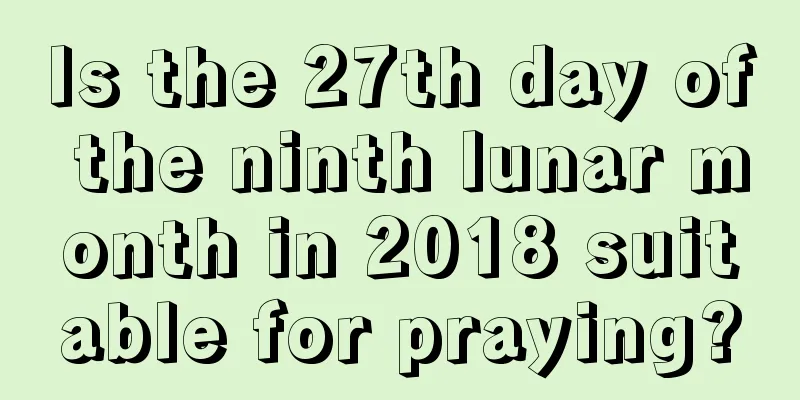What can’t you do on April 19th of the lunar calendar in 2020?

|
What can’t you do on April 19th of the lunar calendar in 2020? Lotus flowers are in full bloom to welcome the arrival of April in the lunar calendar. What are the do’s and don’ts for each day in April? Shuimoxiansheng.com’s special article for April of the lunar calendar in 2020 provides a comprehensive analysis! 1. What day is April 19th in the lunar calendar in 2020?April 19, 2020 (Lunar calendar) Taurus, Monday, May 11, 2020 (Gregorian calendar) [The Gengzi year is Rat, Bishangtu, Xinsi month is Snake, Baila metal, Jiayin day is Tiger, Daxi water] Peng Zu's 100 Taboos: Jia does not open warehouses, Yin does not offer sacrifices. Conflict: Tiger day clashes with (Wu Shen) Monkey. Today's conflicts and combinations: Conflict with Monkey, Punishment with Snake, Harm with Snake, Destroy with Pig, Compatibility with Pig, Triple Combination with Horse and Dog, Six Combination with Pig. Yearly Evil: Yearly Evil North. Constellation: Eastern Heart Moon Fox - Unlucky. Year of Void: Chensi Month: Shenyou Day: Zichou Today's Yin and Yang Noble Gods are in the position of Yang Noble God: Southwest Yin Noble God: Northeast God of Wealth God of Happiness: Northeast God of Fortune: Southeast God of Wealth: Northeast This month's fetal god: The kitchen stove Today's fetal god: Northeast outside the door and stove 2. What are the things to do and not to do on April 19th of the lunar calendar in 2020? 【Today’s Recommendation】 【Today's taboo】 3. The hexagram for today on April 19, 2020, from the old imperial calendar Water and Fire are in Harmony (Ji Ji hexagram), a middle-upper hexagram of the period of prosperity followed by decline. [Xiang says]: Your name will be on the top of the list of successful candidates, which means that all your hard work has paid off. It is auspicious for people to encounter this hexagram, and all their plans will be successful. This hexagram is composed of two different hexagrams (Li on the lower side and Kan on the upper side) stacked on top of each other. Kan represents water and Li represents fire. When water and fire intersect, the water is above the fire. The power of water overwhelms the fire and the fire is put out. Ji means already; Ji means success. Ji Ji means that things have been successful, but something unexpected will happen eventually. 4. Good and bad things to expect on April 19, 2020Today's fortune and misfortune determined by the 12 gods in the old almanac: It's auspicious to get married or bury a wife on the last day of the year, and it's also a good day to travel and buy a house. If you meet Baoyi who likes to stay overnight, everything will be good and you can do business with him. It is not suitable to build on the closing day; the yang house should be visible while the yin house should be hidden. 5. Explanation of terms in “Dos and Don’ts” Sacrifice: refers to the sacrifice in the ancestral hall, that is, the worship of ancestors or the worship in temples, worship of gods, etc. |
<<: Where is the God of Wealth from April 2nd to April 24th, 2020?
Recommend
When is the Ghost Festival in 2019? Is it a good day?
The Zhongyuan Festival, commonly known as the Ghos...
Is July 29th of the lunar calendar in 2021 a suitable date for engagement? What is the engagement process like?
In early July, fruits and vegetables are ripe and ...
Analysis of the ninth day of the sixth lunar month in 2021. Is it a good day to sign a contract?
The pros and cons of signing a contract at differe...
Can I offer sacrifices on the 12th day of the seventh lunar month in 2018? What is my fortune?
Since people are praying to the gods, they should ...
Is it good to have a boy born on June 19th of the lunar calendar in 2022?
Is it good to have a boy born on June 19th of the ...
Is it a good time to travel on the sixth day of the eleventh lunar month in 2017?
Introduction: An auspicious day, as the name sugge...
When is Jingzhe in the lunar calendar in 2019? What seasonal delicacies are there?
Whether it is Jingzhe or other solar terms, they a...
Is it possible to have a caesarean section on the sixth day of the ninth lunar month in 2021? What should I pay attention to before and after a cesarean section?
In September, chrysanthemums bloom proudly in the ...
Is it a good time to travel on March 17th of the lunar calendar in 2021? Where is the God of Wealth on that day?
There are certain rules and regulations for travel...
Is March 29th of the lunar calendar in 2018 suitable for traveling? How auspicious or inauspicious is the day and time?
Spring is the best time to travel. The blooming fl...
Is the second day of the first lunar month in 2022 an auspicious day? How is life?
The good and bad days in the lunar calendar are di...
How is the 21st day of December in the lunar calendar 2021? How about getting married?
The quality of every day is different, so let’s ta...
Teach you how to place the most auspicious God of Wealth
Introduction: In our traditional culture, the God...
Is it good for a child born on the beginning of spring in 2019? What is his fate?
The Beginning of Spring is the time when vitality ...
Where is the God of Wealth on November 22, 2020?
November is one of the three coldest months befor...









